Who is the MAIN (SUPREME) GOD in VEDAS (Rigveda) | Who is the main god of Rigveda? | Who is the first god in the Vedas? | Who is Lord of Vedas?
Namaste friends, how are you doing today? Welcome to #BhagavanBhakthi website / blog.
Bhagavan Lord Sri Vishnu (Krishna, Rama, Trivikrama, Narasimha, Vamana, Vasudeva, Mukunda) and Goddess Lakshmi (Rukmini, Satyabhama, Sita, Kamala, Maya) blessings to you and your family!
In this website / blog, you will always learn about #Hinduism #Sanskrit language.
Also subscribe to my YouTube channel from this link #BhagavanBhakthi to view videos about #Hinduism #Sanskrit language.
Just before moving towards to know about “Who is the MAIN (SUPREME) GOD in VEDAS (Rigveda) | Who is the main god of Rigveda? | Who is the first god in the Vedas? | Who is Lord of Vedas?“, let us know few basic and important information.
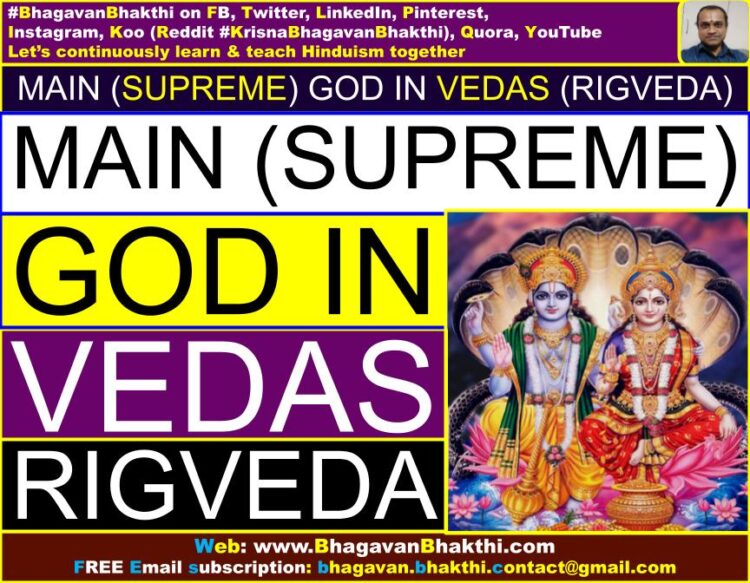
We should always remember that, all mantras, shlokas (hymn), stotrams, words, alphabets, etc. always extol and eulogizes only Lord Vishnu.
This has been said by various Rishis, Sages, Saints, Devatas (Demigods), etc. unlimited times since ‘aadi kalam’ (grand unknown time).
Even all the Puranas, Upanishads, Itihasas, Ramayana, Mahabharata etc. have been revealing the same since the ‘aadi kalam’ (grand unknown time).
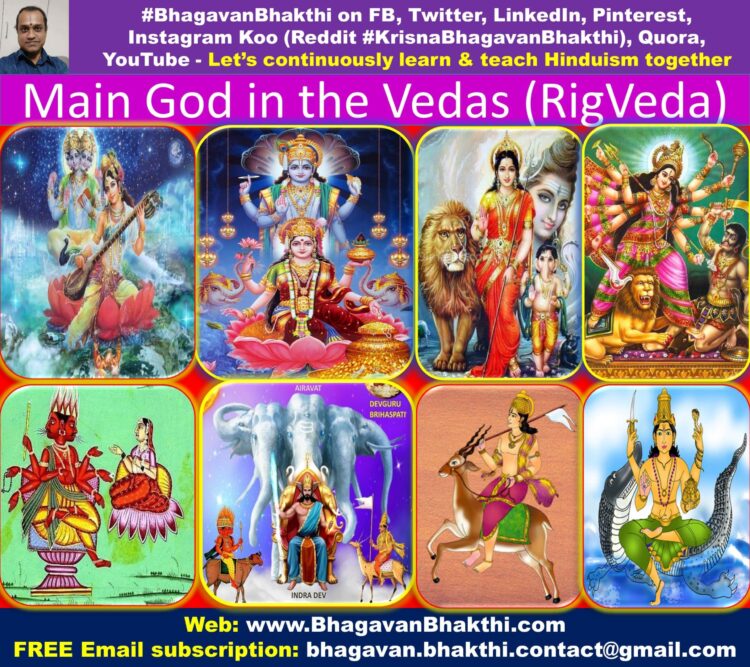
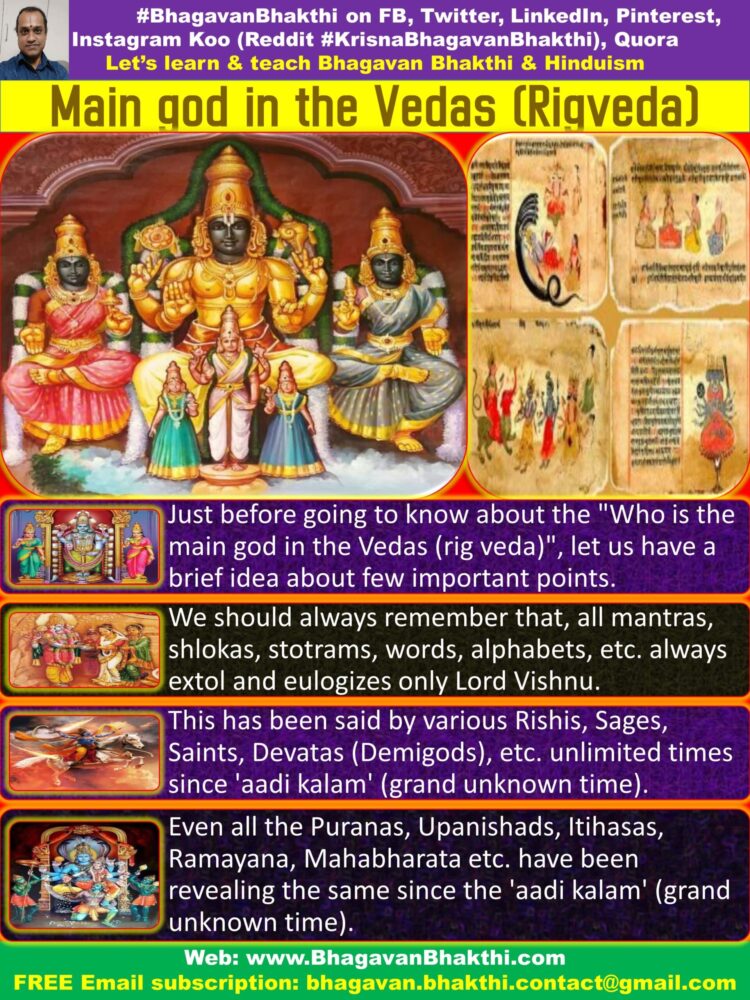
Even the great Vedas have instructed that Lord Vishnu is the supreme and one and only Ishwar (God) and all others are Devatas (Demigods) starting from Goddess Lakshmi,
Lord Brahma, Goddess Sarasvati, Lord Shiva, Goddess Parvati, Lord Indra, Lord Kama Deva, Lord Surya Deva, Lord Chandra Deva, etc.
Thus, it is natural to sneak into the great Vedas and see how it is so. Just moving forward let us know the meaning of the word Rigveda first.
The Rigveda or Rig Veda (ऋग्वेद / ಋಗ್ವೇದ / r̥gvēda), that is, Rigveda = Rig + Veda = Praising + Knowledge.
From outside, it may look that the four Vedas including Rigveda is praising all the Devatas (Demigods), but actually all the Vedas are praising only Lord Vishnu. Lord Vishnu is the antaryami (present inside) of all including Devatas (Demigods).
Thus, even though the Vedas are praising all the Devatas (Demigods), but the inside meaning is that, all the four Vedas are praising only Lord Vishnu.
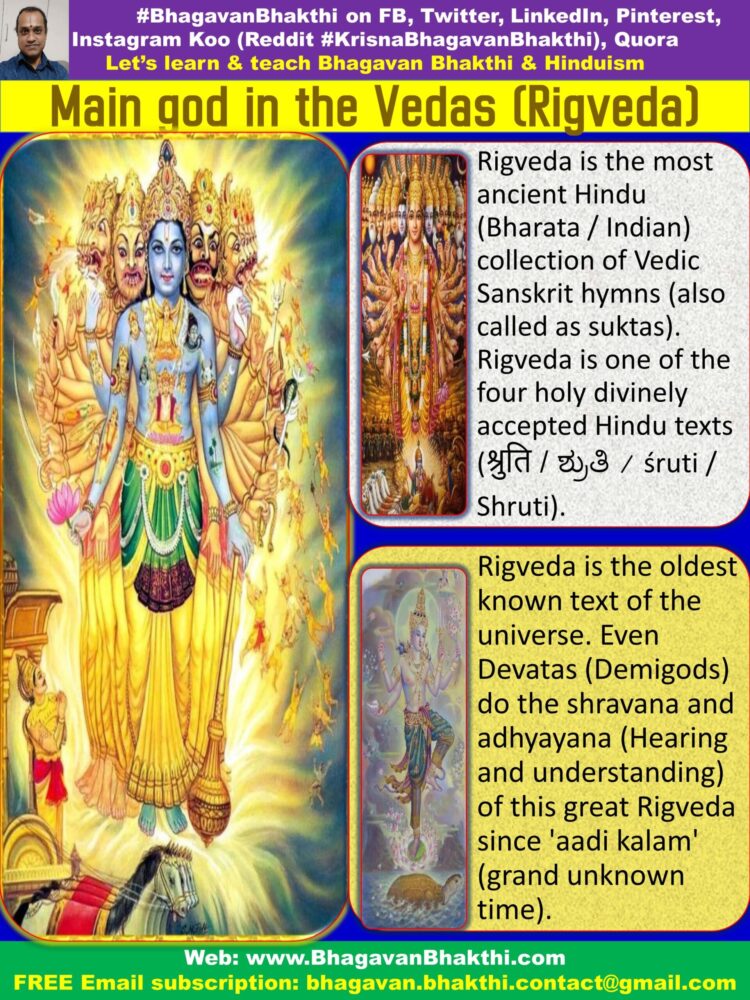
Rigveda is the most ancient Hindu (Bharata / Indian) collection of Vedic Sanskrit hymns (also called as suktas). Rigveda is one of the four holy divinely accepted Hindu texts (श्रुति / ಶ್ರುತಿ / śruti / Shruti).
Rigveda is the oldest known text of the universe. Even Devatas (Demigods) do the shravana and adhyayana (Hearing and understanding) of this great Rigveda since ‘aadi kalam’ (grand unknown time).
Every mantra, every word, every alphabet of Vedas conveys only Lord Vishnu first – Let’s know why and how about his now:
If someone starts counting the frequency of occurrence of the names, for example in Rigveda, then, Lord Indra wins the game and second place goes to Lord Varuna. While the frequency of occurrence of the word Vishnu (Lord Vishnu) is perhaps a distant 10th place.
Then, how come the Vedas is talking mainly about Lord Vishnu?
Let’s know the inside meaning of this now…
There is nothing like a magic wand present in Vedas and no one is trying to do maya (illusion) here. Also, there is nothing like contrived logic used here. Let us understand this by straight facts as per the great Vaishnava Saint Sri Madhvacharya Ji.
Sri Madhvacharya Ji has very much clarified the purport of every mantra, every word and every alphabet of all the Vedas is Lord Vishnu himself with ample examples and illustrations.
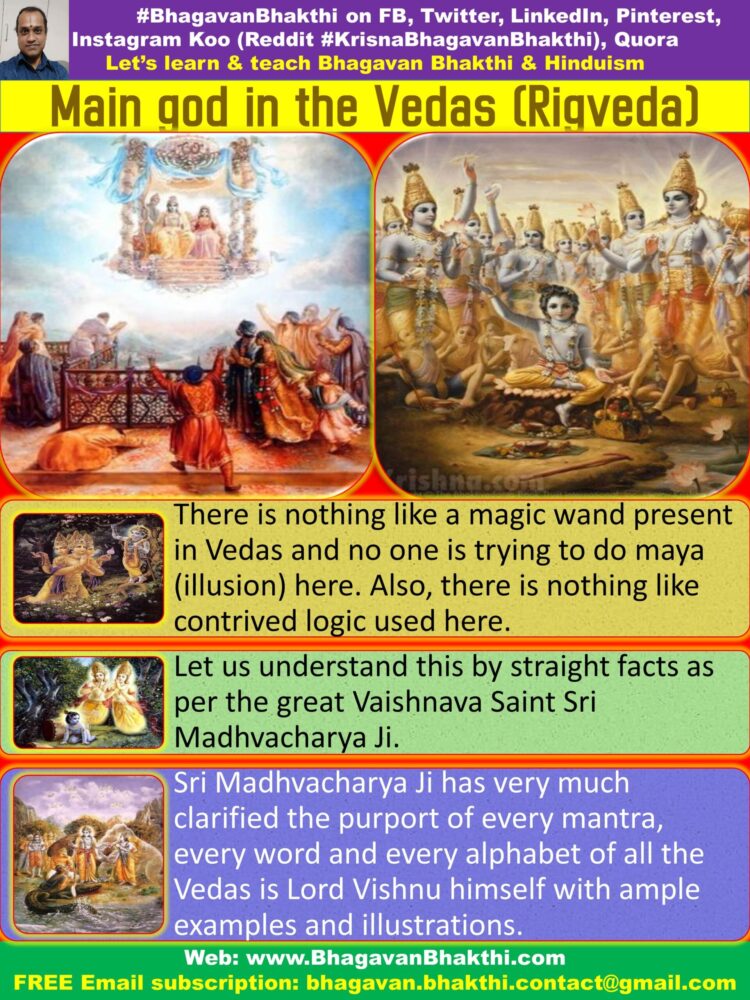
Few of those great examples with samples from the Great Vedas themselves are provided as given below:
The definition of the Vedas does not take statements or pieces of statements separately from its context.
But rather, it is a holistic approach, taking into account the context, proposition, epilogue, event, parables, iterations and logic as a whole. The latter takes precedence, along with ambiguous and unambiguous statements.
1. Taittiriya Brahmana : Taittiriya Brahmana talking about the “One Lord”, but with different names.
यं इंद्रं आहुर्वरुणं यमाहुयं मित्रमाहुयमु सत्यमाहुः | ಯಂ ಇಂದ್ರಂ ಅಹುರ್ವರುಣಂ ಯಮಾಹುಯಂ ಮಿತ್ರಮಾಹುಯಮು ಸತ್ಯಮಾಹುಃ | yaṁ indraṁ ahurvaruṇaṁ yamāhuyaṁ mitramāhuyamu satyamāhuḥ |
(Taittiriya BrAhmaNa 3.7.98)
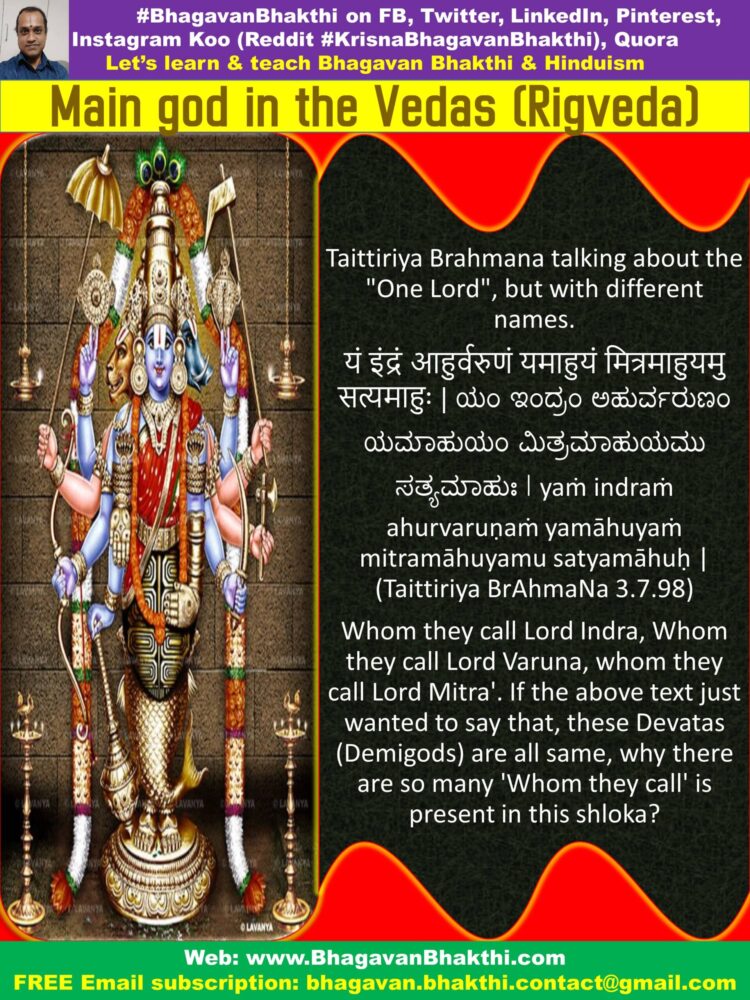
Whom they call Lord Indra, Whom they call Lord Varuna, whom they call Lord Mitra’. If the above text just wanted to say that, these Devatas (Demigods) are all same, why there are so many ‘Whom they call’ is present in this shloka (hymn)?
It is purely redundant. But instead, the repeated usage is to emphasize that, it is the same Supreme Personality who is called by all those names, and not different entity by each name. Thus that one entity is no one self than Lord Vishnu himself.
2. Rigveda 10th Mandala Vishwakarma Sukta : Rigveda 10th Mandala Vishwakarma Sukta, unequivocal talks about all names which apply to Lord Vishnu himself.
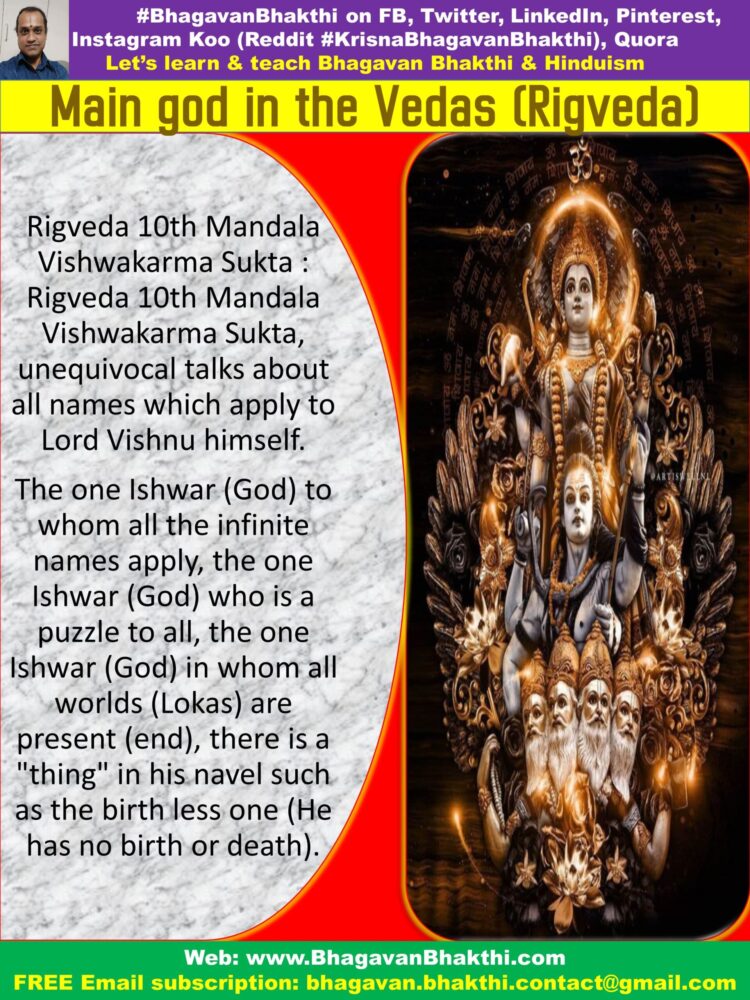
यो न॑: पि॒ता ज॑नि॒ता यो वि॑धा॒ता धामा॑नि॒ वेद॒ भुव॑नानि॒ विश्वा॑ । यो दे॒वानां॑ नाम॒धा एक॑ ए॒व तं स॑म्प्र॒श्नं भुव॑ना यन्त्य॒न्या || 10.82.3 ||
त आय॑जन्त॒ द्रवि॑णं॒ सम॑स्मा॒ ऋष॑य॒: पूर्वे॑ जरि॒तारो॒ न भू॒ना । अ॒सूर्ते॒ सूर्ते॒ रज॑सि निष॒त्ते ये भू॒तानि॑ स॒मकृ॑ण्वन्नि॒मानि॑ || 10.82.4 ||
प॒रो दि॒वा प॒र ए॒ना पृ॑थि॒व्या प॒रो दे॒वेभि॒रसु॑रै॒र्यदस्ति॑ । कं स्वि॒द्गर्भं॑ प्रथ॒मं द॑ध्र॒ आपो॒ यत्र॑ दे॒वाः स॒मप॑श्यन्त॒ विश्वे॑ || 10.82.5 ||
तमिद्गर्भं॑ प्रथ॒मं द॑ध्र॒ आपो॒ यत्र॑ दे॒वाः स॒मग॑च्छन्त॒ विश्वे॑ । अ॒जस्य॒ नाभा॒वध्येक॒मर्पि॑तं॒ यस्मि॒न्विश्वा॑नि॒ भुव॑नानि त॒स्थुः || 10.82.6 ||
(Above is from Rigveda 10.82.3 to 10.82.6)
The one Ishwar (God) to whom all the infinite names apply, the one Ishwar (God) who is a puzzle to all, the one Ishwar (God) in whom all worlds (Lokas) are present (end), there is a “thing” in his navel such as the birth less one (He has no birth or death).
Padma Purana clarifies that, the thing in his navel of this birth less (some one who has no birth or death) one is nothing but the lotus.
Hence, in brief the above statement in 10th mandala of Rigveda tells us clearly that, all names used in Vedas primarily apply to Lord Vishnu himself and secondarily to other Devatas / Demigods.
Even the names like Lakshmi, Brahma, Rudra, Indra, Varuna, Agni etc. all describe only about Lord Vishnu first and then the others.
3. Name of Lord Vishnu : Nevertheless of the Great Vedas specifying different names with different meaning and actions,
but it always proves and refers to certain extraordinary actions and qualities when dealing explicitly with the name of Lord Vishnu.
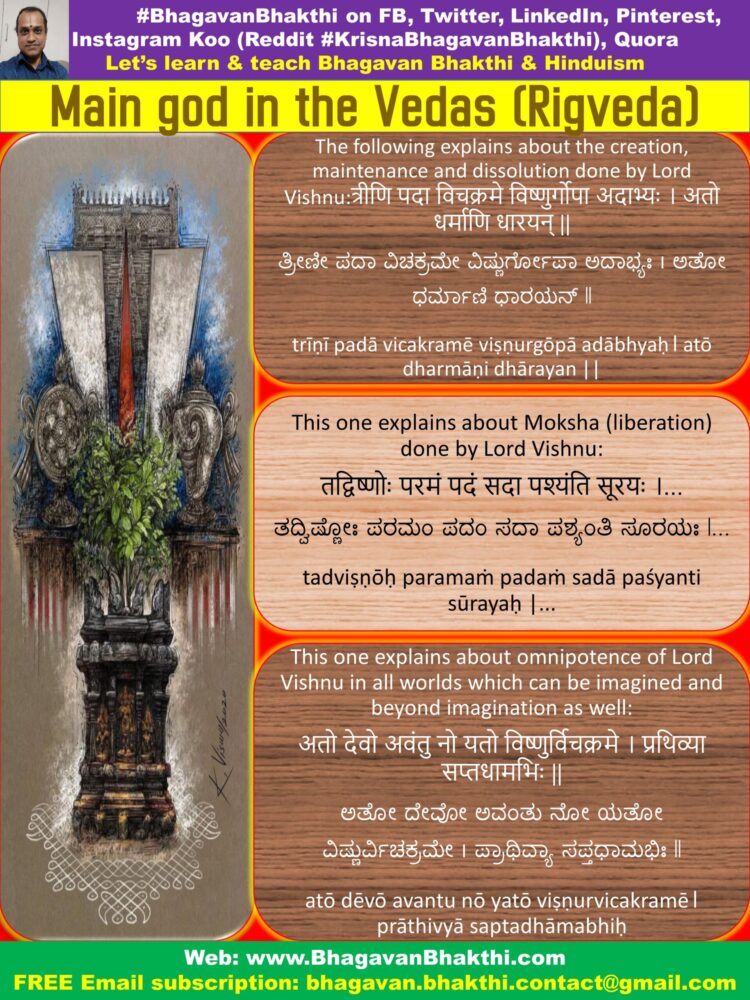
For example : The following explains about the creation, maintenance and dissolution done by Lord Vishnu:
त्रीणि पदा विचक्रमे विष्णुर्गोपा अदाभ्यः । अतो धर्माणि धारयन् || ತ್ರೀಣೀ ಪದಾ ವಿಚಕ್ರಮೇ ವಿಷ್ಣುರ್ಗೋಪಾ ಅದಾಭ್ಯಃ । ಅತೋ ಧರ್ಮಾಣಿ ಧಾರಯನ್ || trīṇī padā vicakramē viṣṇurgōpā adābhyaḥ। atō dharmāṇi dhārayan ||
This one explains about Moksha (liberation) done by Lord Vishnu:
तद्विष्णोः परमं पदं सदा पश्यंति सूरयः ।… ತದ್ವಿಷ್ಣೋಃ ಪರಮಂ ಪದಂ ಸದಾ ಪಶ್ಯಂತಿ ಸೂರಯಃ |… tadviṣṇōḥ paramaṁ padaṁ sadā paśyanti sūrayaḥ |…
This one explains about omnipotence of Lord Vishnu in all worlds which can be imagined and beyond imagination as well:
अतो देवो अवंतु नो यतो विष्णुर्विचक्रमे । प्रथिव्या सप्तधामभिः || ಅತೋ ದೇವೋ ಅವಂತು ನೋ ಯತೋ ವಿಷ್ಣುರ್ವಿಚಕ್ರಮೇ । ಪ್ರಾಥಿವ್ಯಾ ಸಪ್ತಧಾಮಭಿಃ || atō dēvō avantu nō yatō viṣṇurvicakramē। prāthivyā saptadhāmabhiḥ ||
4. Bhallaveya Shruti : Bhallaveya Shruti is making direct connection of all names in one shot:
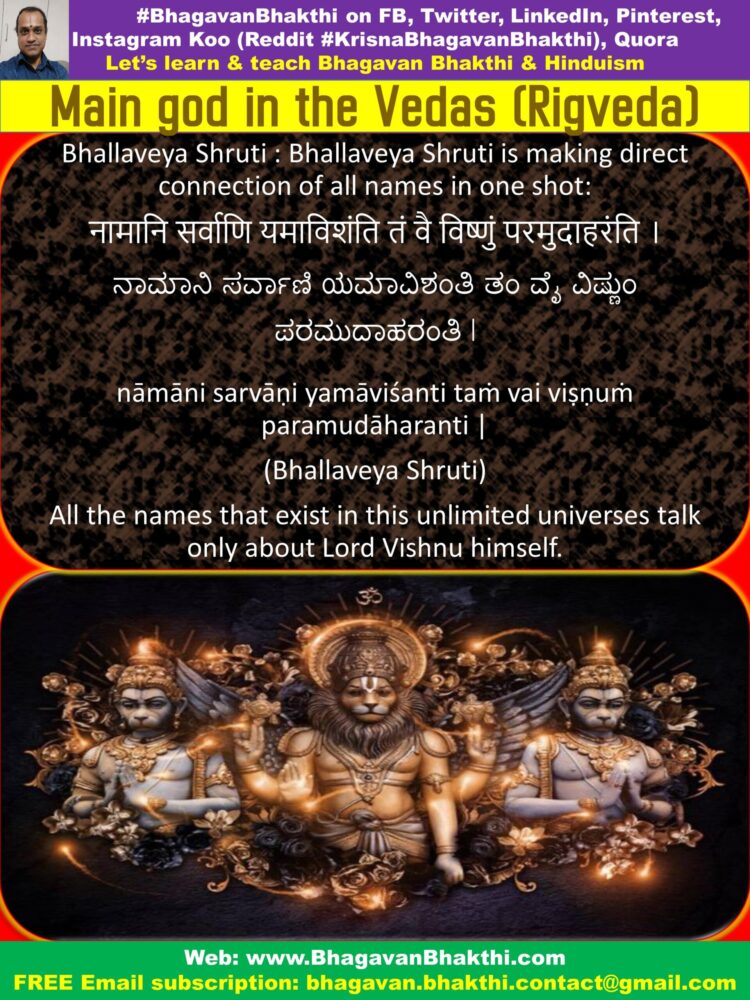
नामानि सर्वाणि यमाविशंति तं वै विष्णुं परमुदाहरंति । ನಾಮಾನಿ ಸರ್ವಾಣಿ ಯಮಾವಿಶಂತಿ ತಂ ವೈ ವಿಷ್ಣುಂ ಪರಮುದಾಹರಂತಿ | nāmāni sarvāṇi yamāviśanti taṁ vai viṣṇuṁ paramudāharanti |
(Bhallaveya Shruti) All the names that exist in this unlimited universes talk only about Lord Vishnu himself.
5. Aitareya Upanishad : The divine ‘Aitareya Upanishad’ hints about that one Supreme Personality whose names contain ष / ಷ / ṣa and ण / ಣ / ṇa pervades everywhere by being indweller of all and is the strength.
The only entity with the name containing ष and ण is विष्णु / ವಿಷ್ಣು / viṣṇu:
षकारो बलं णकार प्राण आत्मा || ಷಕಾರೋ ಬಲಂ ಣಕಾರ ಪ್ರಾಣ ಆತ್ಮಾ || ṣakārō balaṁ ṇakāra prāṇa ātmā ||
Thus it is beyond doubt that all names, terms, words, mantras, alphabets in all the Vedas eugolizes only Lord Vishnu primarily and later that particular Devata (Demigod).
Hence Sri Madhvacharya Ji declares without any second thought in his Brahmasutra Bhashya like given below:
ब्रह्मशब्दश्च विष्णावेव || ಬ್ರಹ್ಮಶಬ್ದಶ್ಚ ವಿಷ್ಣಾವೇವ || brahmaśabdaśca viṣṇāvēva ||
The name Brahman (Brahma) itself is Lord Vishnu name and Lord Vishnu he himself is the Brahman (Brahma). Brahman (Brahma) is not someone who is chosen randomly, someone who is shapeless (nirguna), someone who is indescribable blob, but Lord Vishnu himself.
Thus all the mantras, terms, words, names, alphabets in the Great Vedas describe mainly Lord Vishnu himself.
First shloka (rik / sukta) (hymn) of Rigveda with it’s meaning:
Starting from the very first shloka (rik) (hymn) of Rigveda, that is, “agnimeele purohitam” (अग्निमीळे पुरोहितं / ಅಗ್ನಿಮೀಳೆ ಪುರೋಹಿತಂ / agnimīḷe purōhitaṁ) is as great student as any other for this sneak peek.
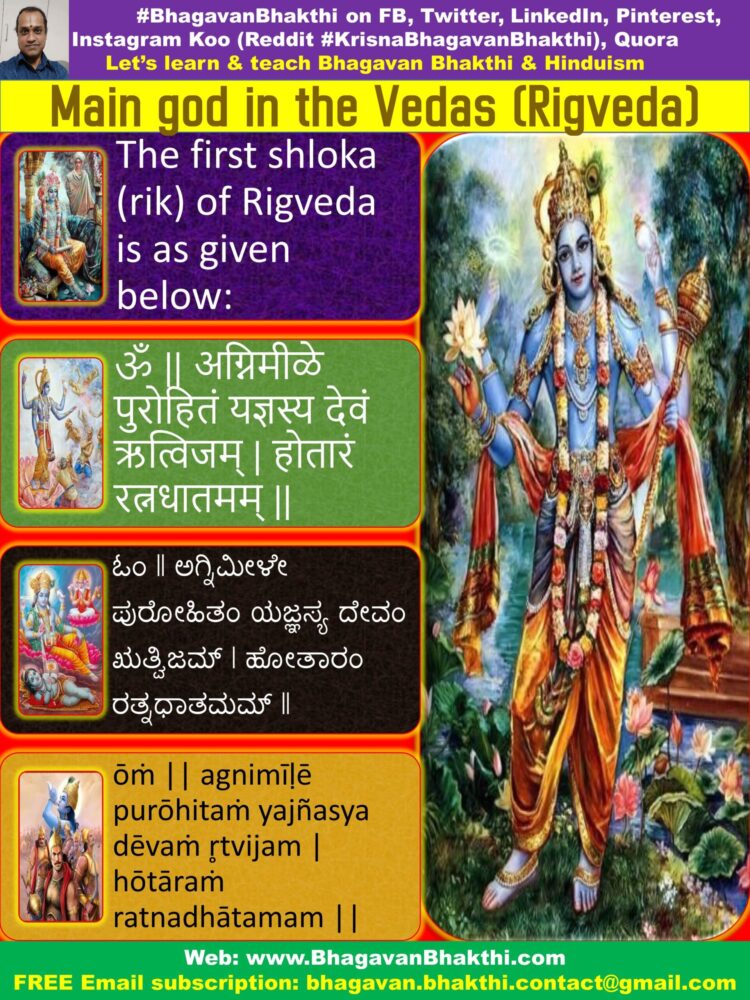
The first shloka (rik) of Rigveda is as given below:
ॐ || अग्निमीळे पुरोहितं यज्ञस्य देवं ऋत्विजम् | होतारं रत्नधातमम् || ಓಂ || ಅಗ್ನಿಮೀಳೇ ಪುರೋಹಿತಂ ಯಜ್ಞಸ್ಯ ದೇವಂ ಋತ್ವಿಜಮ್ | ಹೋತಾರಂ ರತ್ನಧಾತಮಮ್ || ōṁ || agnimīḷē purōhitaṁ yajñasya dēvaṁ r̥tvijam | hōtāraṁ ratnadhātamam || 1.001.01 ||
Here the Devata (Demigod) Lord Agni Deva is praised with 5 attributes as given below:
1. Purohitam (पुरोहितं / ಪುರೋಹಿತಂ / purōhitaṁ) | 2. Yajnasya Devam (यज्ञस्य देवं / ಯಜ್ಞಸ್ಯ ದೇವಂ / yajñasya dēvaṁ) |
3. Ritvijam (ऋत्विजम् / ಋತ್ವಿಜಮ್ / r̥tvijam) | 4. Hotaram (होतारं / ಹೋತಾರಂ / hōtāraṁ) | 5. Ratnadhathamam (रत्नधातमम् / ರತ್ನಧಾತಮಮ್ / ratnadhātamam) |
Meaning of the above shloka (Rik)
1. Purohitam (पुरोहितं / ಪುರೋಹಿತಂ / purōhitaṁ) : Purohitam means, one who does and wishes only good things to all beings irrespective of anything since the ‘aadi kalam’ (grand unknown time / time immemorial).
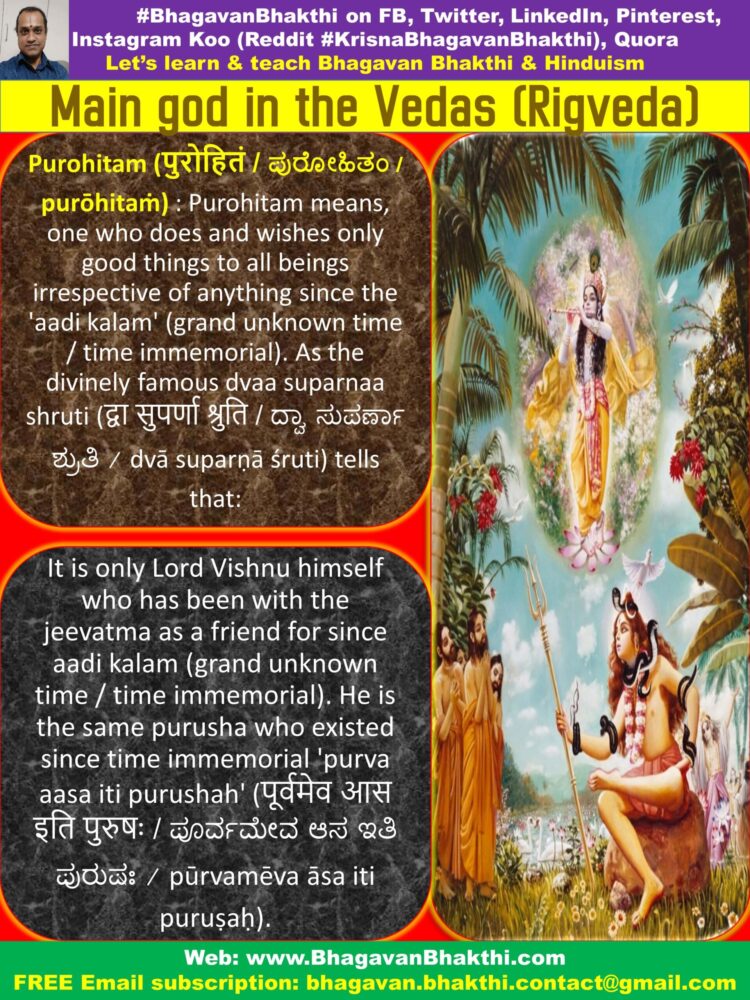
As the divinely famous dvaa suparnaa shruti (द्वा सुपर्णा श्रुति / ದ್ವಾ ಸುಪರ್ಣಾ ಶ್ರುತಿ / dvā suparṇā śruti) tells that:
It is only Lord Vishnu himself who has been with the jeevatma as a friend for since aadi kalam (grand unknown time / time immemorial).
He is the same purusha who existed since time immemorial ‘purva aasa iti purushah’ (पूर्वमेव आस इति पुरुषः / ಪೂರ್ವಮೇವ ಆಸ ಇತಿ ಪುರುಷಃ / pūrvamēva āsa iti puruṣaḥ).
This means, Lord Vishnu is such kind of Supreme Personality (puruṣaḥ), that he is existing since the time immemorial (pūrvamēva). Thus he is none other than Lord Vishnu (Lord Narayana) himself.
2. Yajnasya Devam (यज्ञस्य देवं / ಯಜ್ಞಸ್ಯ ದೇವಂ / yajñasya dēvaṁ) : Yajnasya devam, this means the Ishwar (God) who when presented with real devotion, will definitely accepts our pooja (worship).
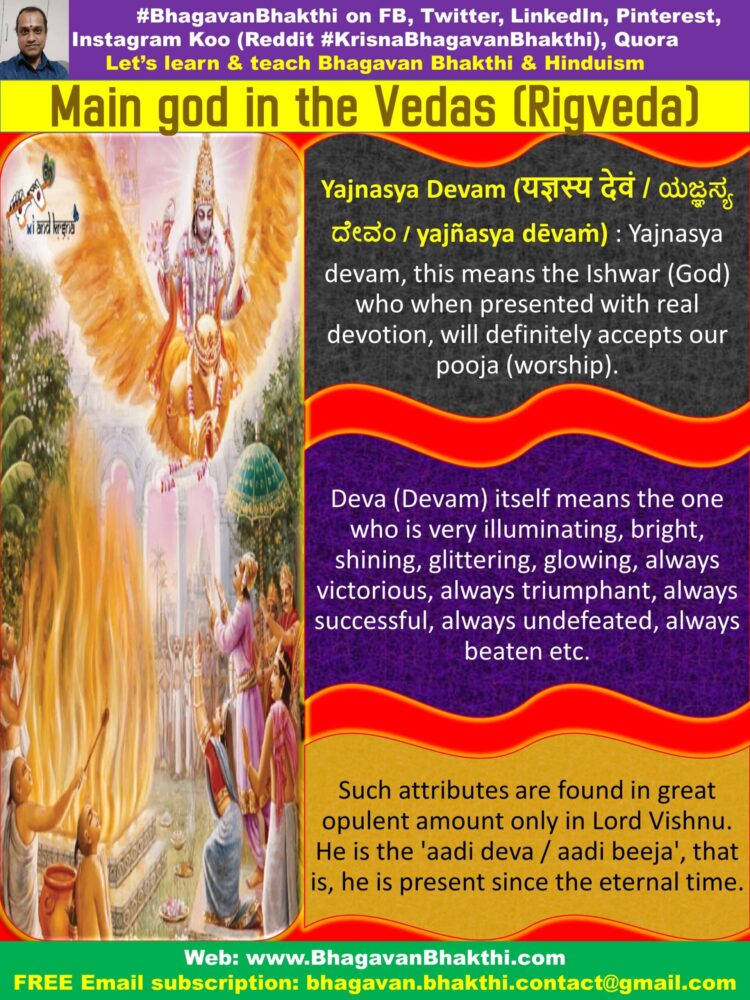
Deva (Devam) itself means the one who is very illuminating, bright, shining, glittering, glowing, always victorious, always triumphant, always successful, always undefeated, always beaten etc.
Such attributes are found in great opulent amount only in Lord Vishnu. He is the ‘aadi deva / aadi beeja’, that is, he is present since the eternal time.
3. Ritvijam (ऋत्विजम् / ಋತ್ವಿಜಮ್ / r̥tvijam) : Usually a Ritvija or Ritvijam is a formal term used for a person who does the yajnam (yajna), e.g., A Poojari (A Purohita).
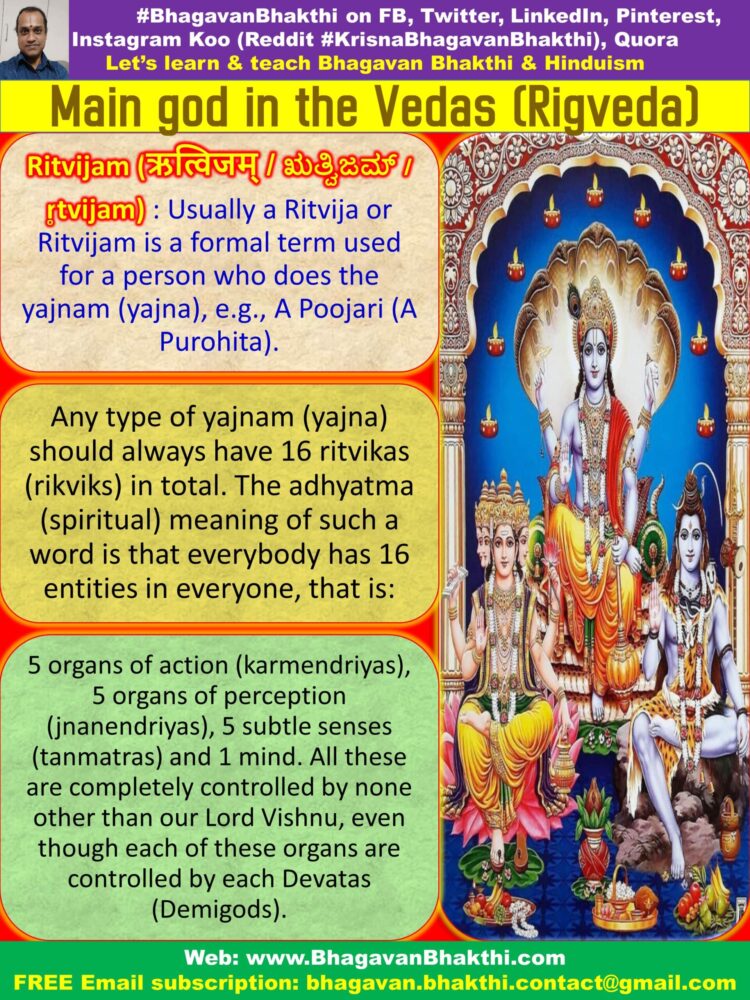
Any type of yajnam (yajna) should always have 16 ritvikas (rikviks) in total. The adhyatma (spiritual) meaning of such a word is that everybody has 16 entities in everyone, that is:
5 organs of action (karmendriyas), 5 organs of perception (jnanendriyas), 5 subtle senses (tanmatras) and 1 mind.
All these are completely controlled by none other than our Lord Vishnu, even though each of these organs are controlled by each Devatas (Demigods).
To know more information about Devatas (Demigods) or tatvabhimani Devatas who control our body parts, please click this link: List of Devatas controlling human body parts
4. Hotaram (होतारं / ಹೋತಾರಂ / hōtāraṁ) : Hotaram almost has the same meaning as Ritvik (See above Ritvijam). He is someone who offers sacrifices in yajna / agni (fire).
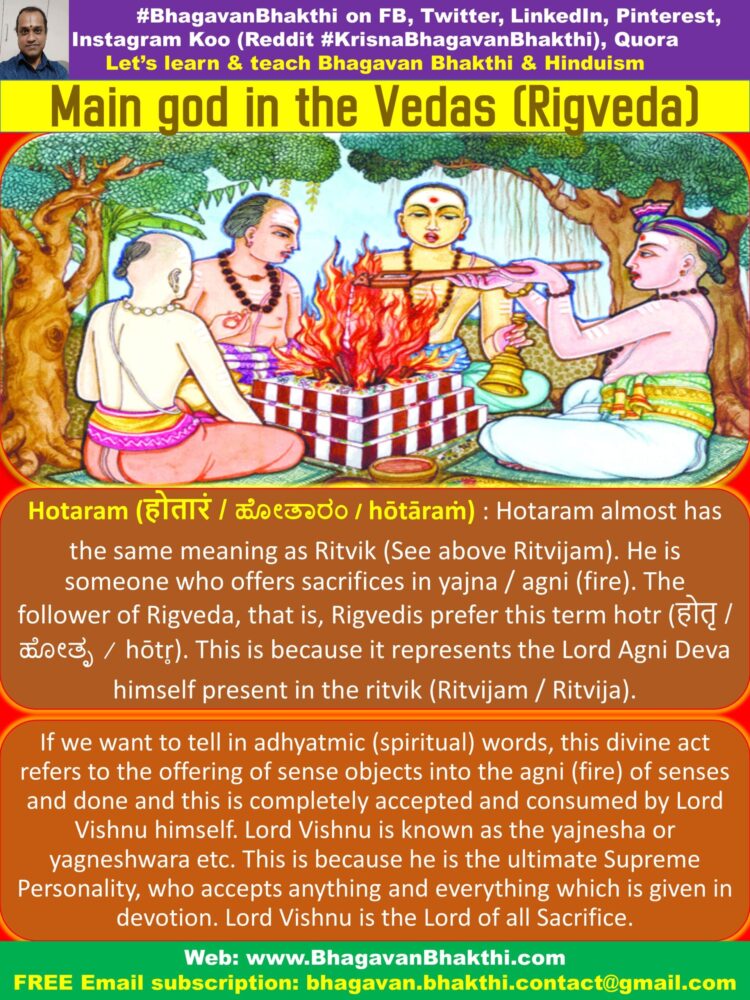
The follower of Rigveda, that is, Rigvedis prefer this term hotr (होतृ / ಹೋತೃ / hōtr̥). This is because it represents the Lord Agni Deva himself present in the ritvik (Ritvijam / Ritvija).
If we want to tell in adhyatmic (spiritual) words, this divine act refers to the offering of sense objects into the agni (fire) of senses and done and this is completely accepted and consumed by Lord Vishnu himself.
Lord Vishnu is known as the yajnesha or yagneshwara etc. This is because he is the ultimate Supreme Personality, who accepts anything and everything which is given in devotion. Lord Vishnu is the Lord of all Sacrifice.
5. Ratnadhathamam (रत्नधातमम् / ರತ್ನಧಾತಮಮ್ / ratnadhātamam) : The Sanskrit word ‘Ratna’ is a synonym term for wealth. Lord Agni Deva (Depending of Lord Vishnu) gives wealth (prosperity) to the doer of yajna.
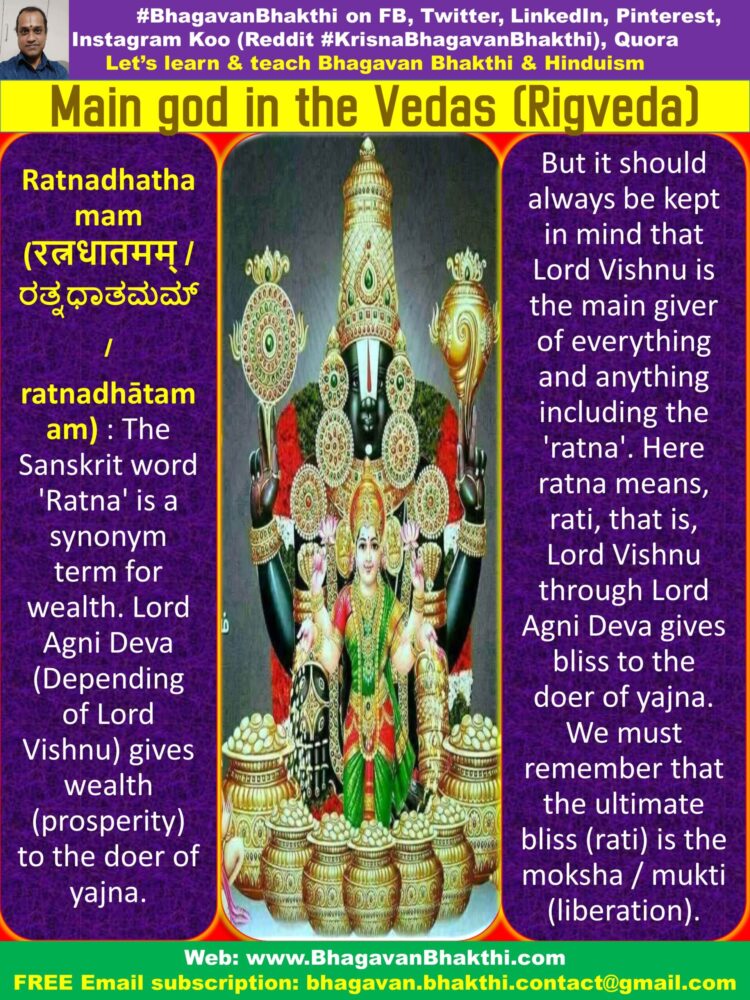
But it should always be kept in mind that Lord Vishnu is the main giver of everything and anything including the ‘ratna’. Here ratna means, rati, that is, Lord Vishnu through Lord Agni Deva gives bliss to the doer of yajna.
We must remember that the ultimate bliss (rati) is the moksha / mukti (liberation). Thus, it is very much clear that, all the qualities eulogized by the attributes in this first shloka (rik) are found in enormous quantity in Lord Vishnu.
Sometimes when certain meanings are considered, such attribute is present only in Lord Vishnu and no one else will be possessing that (those) quality (qualities).
Thus all the shlokas (sukta or rik) of the divine Rigveda is very much Lord Vishnu oriented first and foremost including the above first shloka (sukta or rik).
Now, let us know the following:
Who is Lord Agni Deva?
1. Meaning of Agni : Agni means, he is someone who is worshiped first and most. (But the grand first, that is, प्रपितामह / ಪ್ರಪಿತಾಮಹ / prapitāmaha – The ‘aadi beeja’ or ‘aadi deva’ is Lord Vishnu. Lord Agni Deva is completely dependent on Lord Vishnu).
|| अग्रे नियते इति अग्निः – अग्र एव अभिपूज्यताम् || ಅಗ್ರೇ ನಿಯತೇ ಇತಿ ಅಗ್ನಿಃ – ಅಗ್ರ ಏವ ಅಭಿಪೂಜ್ಯತಾಮ್ || agrē niyatē iti agniḥ – agra ēva abhipūjyatām ||
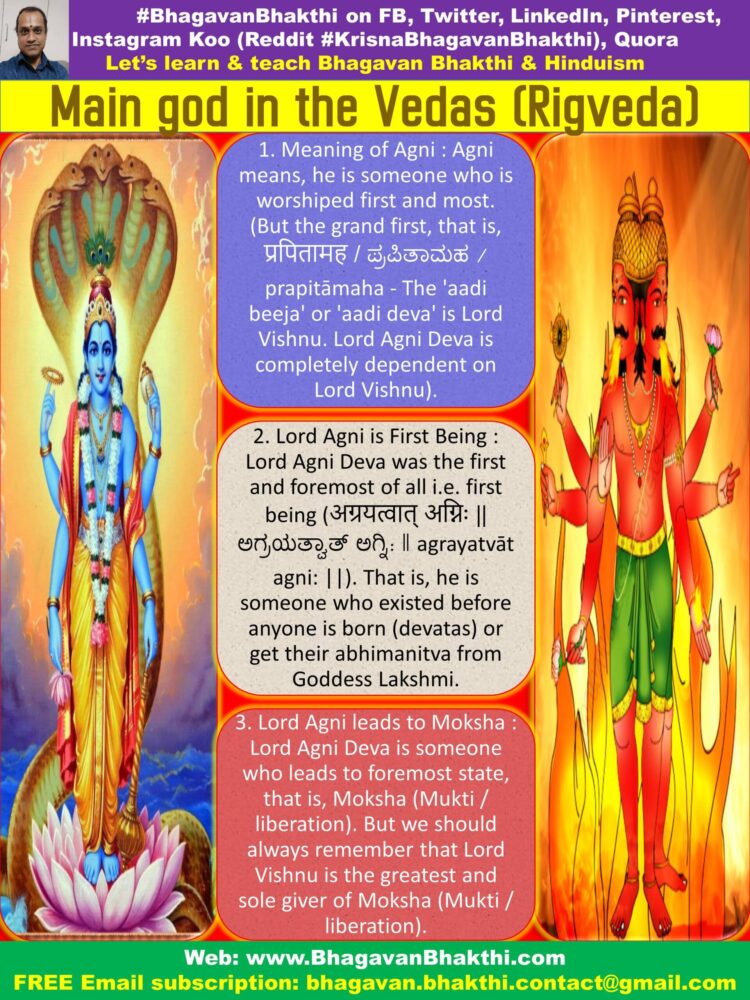
2. Lord Agni is First Being : Lord Agni Deva was the first and foremost of all i.e. first being (अग्रयत्वात् अग्निः || ಅಗ್ರಯತ್ವಾತ್ ಅಗ್ನಿ: || agrayatvāt agni: ||).
That is, he is someone who existed before anyone is born (devatas) or get their abhimanitva from Goddess Lakshmi.
3. Lord Agni leads to Moksha : Lord Agni Deva is someone who leads to foremost state, that is, Moksha (Mukti / liberation). But we should always remember that Lord Vishnu is the greatest and sole giver of Moksha (Mukti / liberation).
अग्रे नयति इति अग्निः || ಅಗ್ರೇ ನಯತಿ ಇತಿ ಅಗ್ನಿ: || agrē nayati iti agni: ||
4. Lord Agni devourer of all beings : Lord Agni Deva is someone, who is the devourer of all beings (living and nonliving beings), that is, devours all at the time of destruction.
But the real and original devourer is Lord Vishnu. Lord Agni Deva always listens to the instructions of Lord Vishnu.
अत्ति इति अग्निः अदनात् अग्निः || ಅತ್ತಿ ಇತಿ ಅಗ್ನಿಃ ಅದನಾತ್ ಅಗ್ನಿಃ || atti iti agniḥ adanāt agniḥ ||
5. Lord Agni activator of body and it’s parts : Lord Agni deva is someone who is the activator of all the bodies and its parts.
अंगनेतृत्वात् अग्निः || ಅಂಗನೇತೃತ್ವಾತ್ ಅಗ್ನಿಃ || aṅganētr̥tvāt agniḥ ||
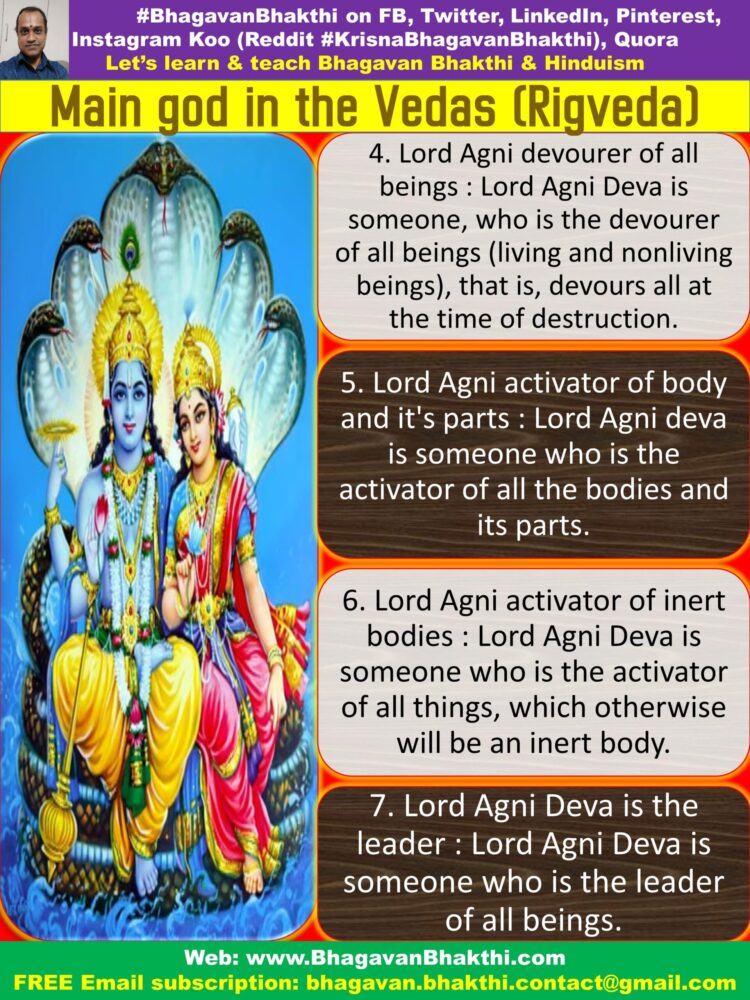
6. Lord Agni activator of inert bodies : Lord Agni Deva is someone who is the activator of all things, which otherwise will be an inert body.
अगं नयति इति अग्निः || ಅಗಂ ನಯತಿ ಇತಿ ಅಗ್ನಿಃ || agaṁ nayati iti agniḥ ||
7. Lord Agni Deva is the leader : Lord Agni Deva is someone who is the leader of all beings.
अग्रणीत्वात् अग्निः || ಅಗ್ರಣೀತ್ವಾತ್ ಅಗ್ನಿಃ || agraṇītvāt agniḥ ||
अग्रणी ग्रामणी श्रीमान… इति श्री विष्णुसहस्रनामे || ಅಗ್ರಣೀ ಗ್ರಾಮಣಿ ಶ್ರೀಮಾನ್… ಇತಿ ಶ್ರೀ ವಿಷ್ಣುಸಹಸ್ರನಾಮೇ || agraṇī grāmaṇi śrīmān… iti śrī viṣṇusahasranāmē ||
But the original ‘Leader’ is Lord Vishnu.
PS : Here also all the qualities and characteristics expounded by the word ‘Agni’ are present in great abundance in Lord Vishnu and sometimes only in Lord Vishnu.
Thus it should always be remembered that ‘Agni’ in no doubt is primarily the name of Lord Vishnu. Lord Vishnu is the doer of anything and everything.
Hinduism speaks about monotheism and not polytheism. Lord Vishnu is the only Ishwar (God) in Hinduism and all others are his followers starting from Goddess Lakshmi,
Lord Brahma, Goddess Sarasvati, Lord Shiva, Goddess Parvati, Lord Indra, Lord Surya, Lord Chandra etc. etc. etc.
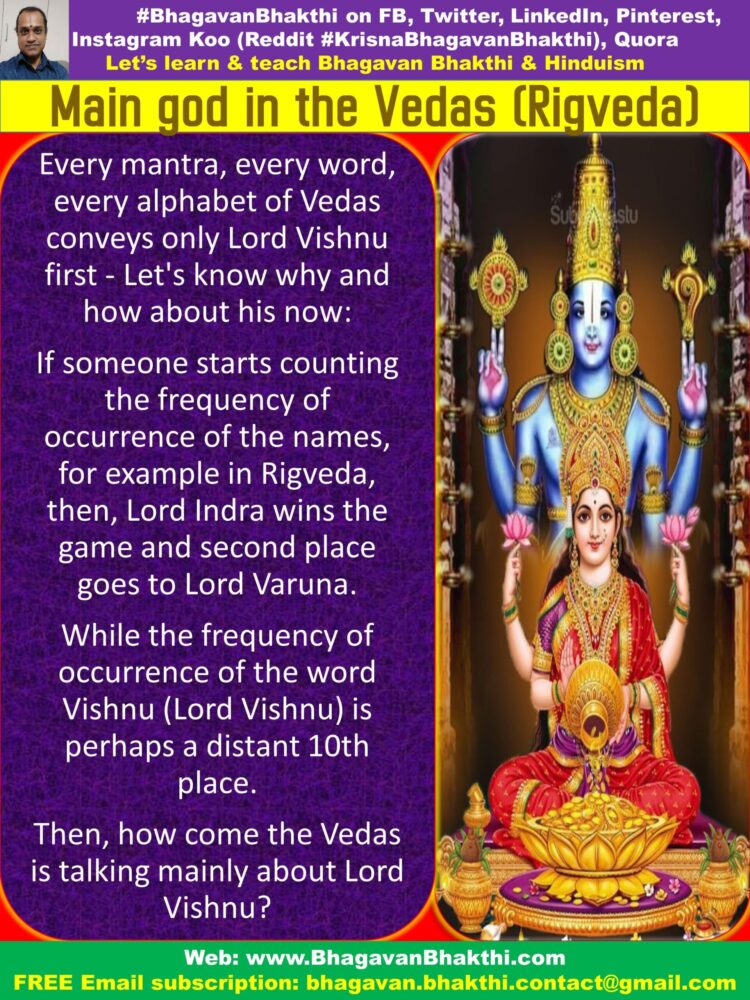
More information will be added to this on regular basis. Please this post and other posts of this website / blog to get the updated information.
To watch videos on #Hinduism #Sanskrit language, SUBSCRIBE to my YouTube channel from this link: #BhagavanBhakthi YouTube channel
To know about “What are Krishna Tulsi vivah (marriage) amazing facts”, click this link: What are Krishna Tulsi vivah (marriage) amazing facts
Dear friends, if you need any clarifications about this post, kindly let me know, I will definitely try to answer all of them.
Also your one LIKE, one COMMENT, One Share, one SUBSCRIPTION is highly important.
This will help to know the quality of this content and also it will be helpful to know if any improvements is required for the content.
If you feel this content is useful to you and has helped you to improve your knowledge, kindly share this with your well-wishers.
Because “SHARING MEANS CARING”.
To receive FREE EMAIL SUBSCRIPTION about #BhagavanBhakthi, you can send an email to bhagavan.bhakthi.contact@gmail.com from your email ID.
NAMASTE!
Sri Gurubhyo Namaha
Sri Tulasi Krishnaaya Namaha
Sri Krishnaarpanamastu
Share in Social Media